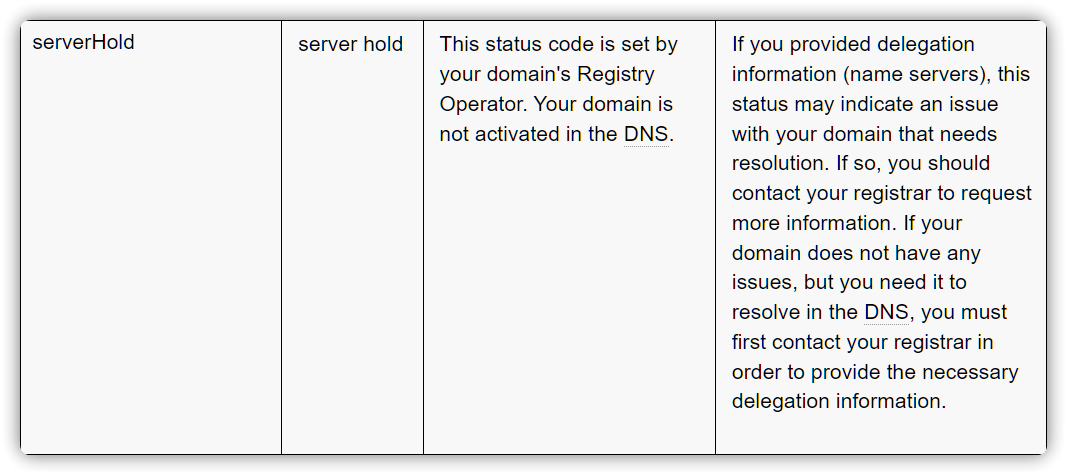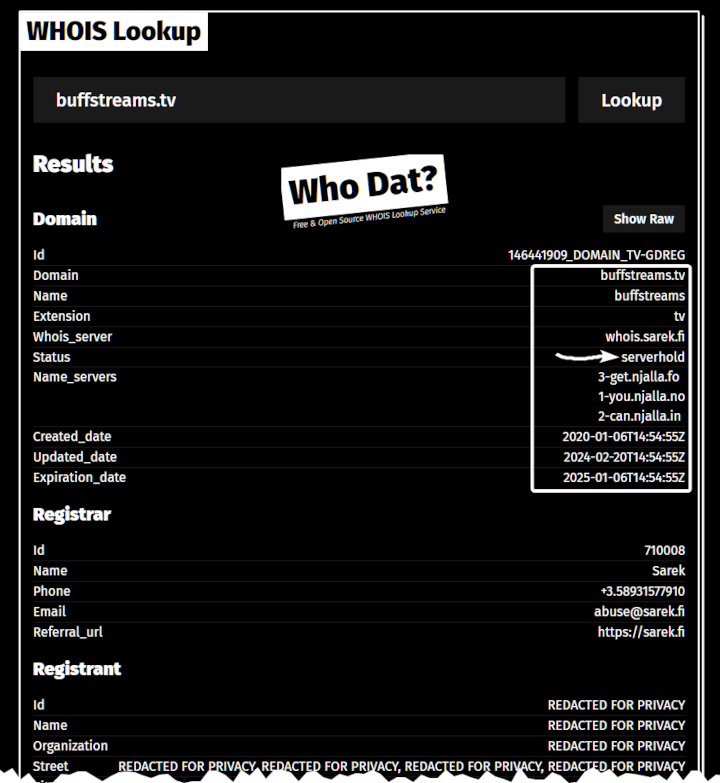-
chevron_right
Njalla: Hundreds of Suspended .TV Domains Could Soon Return to Life
news.movim.eu / TorrentFreak · Monday, 26 February - 11:07 · 4 minutes
 The last time over 200 pirate sites went offline at the same time was…..well, probably never. Certainly, so many sites have never gone down and stayed down for four days straight in what still amounts to a relatively tight niche.
The last time over 200 pirate sites went offline at the same time was…..well, probably never. Certainly, so many sites have never gone down and stayed down for four days straight in what still amounts to a relatively tight niche.
Yet that’s exactly what happened this week , when at least 200 .TV domains were suddenly rendered useless. WHOIS records revealed that the domains had a status of ‘serverHold’ which indicates a domain with no presence in the domain name system.
Registry >> Registrar >> Domain Owner
The suspended domains were all registered at Sarek Oy, the Finland-based domain registrar with connections to former Pirate Bay spokesman, Peter Sunde. Those in need of a liberal, privacy-focused domain registrar, with a pedigree supported by thousands of news articles, countless interviews, TV appearances, and a full-blown movie, have fewer reasons than most to shop for domains elsewhere.
Site operators understand Peter and he understands their requirements, as other projects including Njalla demonstrate. Unfortunately, when everything went dark Tuesday/Wednesday with no sign of recovery by Thursday, lack of information from obvious sources seemed to have no solution.
When domains are placed on ‘serverHold’ that’s the work of domain registries, not registrars, but domain owners still need to know where they stand.
Frustrations Build
One of those people is Jomo, the owner of Jomo.tv, which unlike most of the .TV domains currently suspended, isn’t a pirate site.
“I use the affected domain for my tech blog and my email address. I have received zero information about what’s going on, and I don’t know if or when this is going to be resolved,” Jomo told TF early on Friday.
“Njalla does not seem to know anything, the registry did not want to tell me anything and only referred to Sarek without any further info, and Sarek does not respond at all.”
GoDaddy completed its takeover of registry services for .TV domains late 2022, after previous controller Verisign chose not to bid when .TV last came up for grabs. When attempting to contact GoDaddy for comment earlier this week, TorrentFreak’s first email received an automatic response saying “Message blocked” while a second to a different address informed us that “The recipient’s mailbox is full and can’t accept messages now.”
While frustrating for us, domain owners like Jomo had serious issues to contend with.
“It is extremely frustrating to not get any info or updates, in addition to being unable to send or receive any emails, and being unable to log in to several services. By now I’m sure some emails are lost forever as the domain has been unavailable for several days,” Jomo added.
Problem Acknowledged on Friday
When no official updates were provided on Thursday, the situation was looking increasingly grim. Then on Friday, Jomo suddenly had luck reaching GoDaddy via TurnOn.tv.
“They actually replied fairly quickly,” Jomo says, “but only told me to ‘contact your sponsoring registrar, Sarek Oy.'”
After logging into his Njalla account, a new message appeared: “Some .tv domains have been put on serverHold by the registry and we are in contact with them to resolve the issue.” There was no response to his support ticket filed earlier but at least the issue had been acknowledged.
Then a few hours later, a ray of light appeared at the end of the tunnel.
‘Technical Issue’ Resolved With Registry
After three days without any useful information, Jomo received a response from Njalla, sometime Friday evening we believe.
“It is a technical issue. We’ve squared things out with the registry and we’re just waiting for them to lift the serverHold,” a message from Njalla reads.
“That will happen anywhere between in a few minutes till Monday, but we’re hoping sooner than later of course. We apologize for the troubles it had caused.”
At the time of writing, Jomo’s domain still hasn’t returned and when we last checked, the same was true for around 200 others. While there’s optimism that all domains will eventually return to service, the episode leaves big questions unanswered.
The Information Age
Perhaps the most pressing question from a consumer perspective is the decision by the registry to suspend so many domains in one swoop with zero notice. The fact that so many domains are used by pirate sites does muddy the waters somewhat but as Jomo will confirm, non-pirate sites are affected too.
When a particular entity takes action to suspend domains, whose responsibility is it to keep customers informed? In this case the action was taken by the registry but when asked to provide information, the registry refused to supply it, referring questions back to the registrar instead.
Problems Over, or More to Come?
Then there’s the question of the issue that prompted the suspensions; what was it and is it likely to reoccur? Should domain registrants avoid .TV domains? Without information to the contrary, rightly or wrongly some will draw that conclusion.
Of course, by offering domains with toughened privacy, Sarek Oy/Njalla find themselves disproportionately involved in legal proceedings where a plaintiff hopes to identify a domain operator but runs into firewall instead.
A live case in the United States required various domain registrars including GoDaddy, Namecheap and Sarek Oy, to take action against several app stores to prevent apps with ‘Temu’ branding being made available to the public.
As far as we can see, Namecheap, GoDaddy, and Sarek Oy were ordered to disable the platforms’ domains but to date, only domains registered through Sarek remain both intact and online.
At least in part, that’s to be expected and to some extent, the service as promised. Also to be expected are complications arising from an accumulation of these types of cases and similar disputes that come with the territory, the supply of which seems endless.
From: TF , for the latest news on copyright battles, piracy and more.






